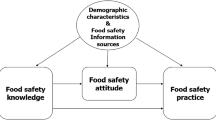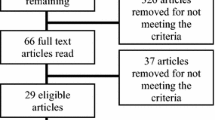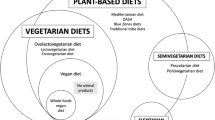Abstract
Aim
The term food desert generally refers to areas where healthy food options, such as fresh fruits and vegetables, are unavailable within a certain number of miles. However, other factors besides distance may affect the ability to purchase healthier foods. The goal of this study was to understand Colorado adults’ perceptions of their access to healthy food options and to assess how other structural and socio-demographic factors may affect that access.
Subject and methods
Colorado adults were asked questions about self-reported access to healthy food, likelihood of buying fresh fruits and vegetables from convenience/corner stores if available, perceived characteristics of fruits and vegetables available for purchase near respondents’ residence, and demographics.
Results
A majority of Colorado adults in 2013–14 reported wanting fresh fruits and vegetables to be more available, more varied, higher quality, and/or less expensive. Socioeconomic status, race/ethnicity, and regular shopping habits were significantly associated with reported likelihood of purchasing fruits and vegetables from a convenience/corner store if available.
Conclusion
Factors other than proximity to a grocery store affect Colorado adults’ perceived access to healthy food options and should be considered in the development and implementation of public health programs and policies geared toward improving healthy food access.
Similar content being viewed by others
References
Act to Enact The Corner Store Initiative Act to Assist Healthy Food Small Retailers, 250, HOUSE DRH20091-MC-99A* (2015).
Aggarwal A, Cook AJ, Jiao J et al (2014) Access to supermarkets and fruit and vegetable consumption. Am J Public Health 104(5):917–923. https://doi.org/10.2105/AJPH.2013.301763
Blitstein JL, Snider J, Evans WD (2012) Perceptions of the food shopping environment are associated with greater consumption of fruits and vegetables. Public Health Nutr 15(6):1124–1129. https://doi.org/10.1017/S1368980012000523
Bustillos B, Sharkey JR, Anding J, McIntosh A (2009) Availability of more healthful food alternatives in traditional, convenience, and nontraditional types of food Stores in two Rural Texas Counties. J Am Diet Assoc 109(5):883–889. https://doi.org/10.1016/j.jada.2009.02.011
Tim Carman (2011) DCCK to deliver produce to D.C. food deserts. Washington Post. https://www.washingtonpost.com/blogs/all-we-can-eat/post/dcck-to-deliver-produce-to-dc-food-deserts/2011/08/17/gIQAZsczLJ_blog.html. Accessed 9 Jan 2019
Casagrande SS, Franco M, Gittelsohn J et al (2011) Healthy food availability and the association with body mass index in Baltimore City, Maryland. Public Health Nutr 14(6):1001–1007. https://doi.org/10.1017/S1368980010003812
Garfinkel-Castro A, Kim K, Hamidi S, Ewing R (2017) Obesity and the built environment at different urban scales: examining the literature. Nutr Rev 75(suppl_1):51-61. https://doi.org/10.1093/nutrit/nuw037
Ghosh-Dastidar B, Cohen D, Hunter G et al (2014) Distance to store, food prices, and obesity in urban food deserts. Am J Prev Med 47(5):587–595. https://doi.org/10.1016/j.amepre.2014.07.005
Gravlee CC, Boston PQ, Mitchell MM, Schultz AF, Betterley C (2014) Food store owners’ and managers’ perspectives on the food environment: an exploratory mixed-methods study. BMC Public Health 14:1031. https://doi.org/10.1186/1471-2458-14-1031
James KA, Levinson AH, Li Y, Baumann C, Maffey A (2018) A population sample registry for public health survey investigations: methods, lessons, and successes. Int J Soc Res Methodol 21(5):565–574. https://doi.org/10.1080/13645579.2018.1451732
Jetter KM, Cassady DL (2006) The availability and cost of healthier food alternatives. Am J Prev Med 30(1):38–44. https://doi.org/10.1016/j.amepre.2005.08.039
Krukowski RA, Sparks C, DiCarlo M, McSweeney J, West DS (2013) There’s more to food store choice than proximity: a questionnaire development study. BMC Public Health 13(1):586. https://doi.org/10.1186/1471-2458-13-586
Larson NI, Story MT, Nelson MC (2009) Neighborhood environments: disparities in access to healthy foods in the U.S. Am J Prev Med 36(1):74-81.e10. https://doi.org/10.1016/j.amepre.2008.09.025
Mayne SL, Auchincloss AH, Michael YL (2015) Impact of policy and built environment changes on obesity-related outcomes: a systematic review of naturally-occurring experiments. Obes Rev 16(5):362–375. https://doi.org/10.1111/obr.12269
Middleton KR, Anton SD, Perri MG (2013) Long-term adherence to health behavior change. Am J Lifestyle Med 7(6):395–404. https://doi.org/10.1177/1559827613488867
Moore LV, Diez Roux AV (2006) Associations of neighborhood characteristics with the location and type of food stores. Am J Public Health 96(2):325–331. https://doi.org/10.2105/AJPH.2004.058040
Morland KB, Evenson KR (2009) Obesity prevalence and the local food environment. Health Place 15(2):491–495. https://doi.org/10.1016/j.healthplace.2008.09.004
Morland K, Wing S, Roux AD (2002) The contextual effect of the local food environment on residents’ diets: the atherosclerosis risk in communities study. Am J Public Health 92(11):1761–1768
Pearson T, Russell J, Campbell MJ, Barker ME (2005) Do ‘food deserts’ influence fruit and vegetable consumption?—a cross-sectional study. Appetite 45(2):195–197. https://doi.org/10.1016/j.appet.2005.04.003
Powell LM, Slater S, Mirtcheva D, Bao Y, Chaloupka FJ (2007) Food store availability and neighborhood characteristics in the United States. Prev Med 44(3):189–195. https://doi.org/10.1016/j.ypmed.2006.08.008
Rose D, Richards R (2004) Food store access and household fruit and vegetable use among participants in the US food stamp program. Public Health Nutr 7(8):1081–1088. https://doi.org/10.1079/PHN2004648
Trogdon JG, Finkelstein EA, Feagan CW, Cohen JW, State- and Payer-Specific Estimates of Annual Medical Expenditures Attributable to Obesity (2012) Obesity 20(1):214–220. https://doi.org/10.1038/oby.2011.169
USDA ERS (n.d.) Documentation. https://www.ers.usda.gov/data-products/food-access-research-atlas/documentation/. Accessed 26 Mar 2019
Weinberg Z (1995) No Place to Shop: The Lack of Supermarkets in Low-Income Neighborhoods : Analysis of a University of Connecticut Study on Low-Income Communitites and Households Receiving Public Assistance in 21 Metropolitan Areas. Public Voice for Food and Health Policy
Xu Y, Wen M, Wang F (2015) Multilevel built environment features and individual odds of overweight and obesity in Utah. Appl Geogr 60:197–203. https://doi.org/10.1016/j.apgeog.2014.10.006
Zenk SN, Schulz AJ, Israel BA, James SA, Bao S, Wilson ML (2006) Fruit and vegetable access differs by community racial composition and socioeconomic position in Detroit, Michigan. Ethn Dis 16(1):275–280
Funding
This work was supported by the Colorado Department of Public Health and Environment, grant ID: 16 FLA 79815.
Author information
Authors and Affiliations
Contributions
Authors Katherine A. James, Renee Calanan, and Arnold Levinson contributed to the study conception and design and performed materials preparation and data collection. Data analysis was performed by Yaqiang Li and Francesca Macaluso. All authors contributed to the development of the manuscript and approved the final version for publication.
Corresponding author
Ethics declarations
Conflict of interest
The authors declare that they have no conflict of interest.
Research involving human participants
This study was performed in line with the principles of the Declaration of Helsinki. Approval was granted by the Colorado Multiple Institutional Review Board (COMIRB) prior to study activities (#05–0785).
Informed consent
Informed consent was obtained from each participant prior to study activities in both the parent study and as part of the survey registry.
Additional information
Publisher’s note
Springer Nature remains neutral with regard to jurisdictional claims in published maps and institutional affiliations.
Disclaimer
The findings and conclusions in this report are those of the authors and do not necessarily represent the official position of the Centers for Disease Control and Prevention.
Rights and permissions
About this article
Cite this article
James, K.A., Calanan, R., Macaluso, F. et al. Convenience and corner store fruit and vegetable access: attitudes and intentions among Colorado adults, 2014. J Public Health (Berl.) 30, 871–878 (2022). https://doi.org/10.1007/s10389-020-01358-0
Received:
Accepted:
Published:
Issue Date:
DOI: https://doi.org/10.1007/s10389-020-01358-0




